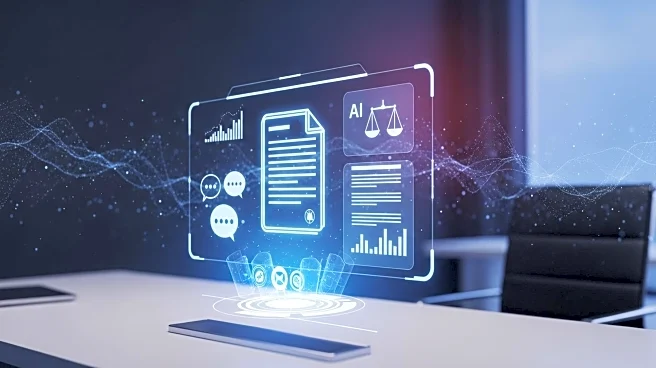What's Happening?
The legal profession is undergoing a transformation with the integration of artificial intelligence (AI) tools such as Harvey, Spellbook, and Lex Machina. These technologies are reshaping how lawyers conduct research, draft documents, and analyze legal issues. Traditionally, the legal field has been characterized by complex and dense language, often seen as a mark of competence. However, AI is challenging this norm by handling routine tasks like contract clause spotting and formatting, thereby freeing lawyers to focus on more nuanced and human aspects of their work. This shift encourages lawyers to communicate more clearly and align their advice with business objectives, moving away from exhaustive legalese to more straightforward and actionable recommendations.
Why It's Important?
The integration of AI in legal practice holds significant implications for the industry. By automating routine tasks, AI allows lawyers to dedicate more time to developing skills that AI cannot replicate, such as judgment, prioritization, and practical legal analysis. This shift is crucial as businesses increasingly demand clarity and actionable advice rather than lengthy legal analyses. The ability to communicate effectively and provide sound judgment in plain language becomes a valuable asset, potentially elevating the role of lawyers as strategic partners in business. This transformation could lead to a reevaluation of how legal services are valued, focusing more on the quality of advice rather than the quantity of analysis.
What's Next?
As AI continues to evolve, the legal profession may see further changes in how legal services are delivered and valued. Lawyers will need to adapt by enhancing their communication skills and focusing on providing strategic advice that aligns with business goals. This evolution may also prompt legal education to emphasize these skills, preparing future lawyers for a landscape where AI plays a significant role. Additionally, law firms and legal departments might invest more in AI technologies to remain competitive and meet the changing expectations of their clients.
Beyond the Headlines
The ethical implications of AI in law are also worth considering. As AI takes on more tasks, questions about data privacy, bias in AI algorithms, and the potential for over-reliance on technology may arise. Legal professionals will need to navigate these challenges carefully, ensuring that AI is used responsibly and ethically. Furthermore, the cultural shift towards clearer communication may influence other sectors, encouraging a broader move away from jargon-heavy language in professional settings.










